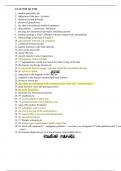Lecture week 1
Age and Crime
- Fact: Adolescents and young adults commit a disproportionate amount of crime
- Data:
● Official data: arrests peak in late teens / early 20s
● Self-report: teens and young adults report more criminal behaviour than other age
groups
● Victim surveys: victims most commonly report offenders to be teenagers / young
adults.
Enter…
- Hirschi & Gottfredson (1983):
● Age-crime curve one of the ‘brute facts of criminology’
- Crime declines with age: ‘maturational reform’, ‘ageing-out’
● Invariant, Consistent explanations across age, Difference in degree
- So… why do we need criminal careers and longitudinal research?
Age-crime curve
- Why does crime decline with age
● Changes in social roles and context
● Depends on the type of crime
● ‘Society at large is faced perennially with an invasion of barbarians… [and] every adult
generation is faced with the task of civilizing those barbarians.’ - Ryder, 1989
- What does it tell us?
● How crime is distributed across a population according to the age of a population
● how distribution varies by crime type or over time
● Shared social behaviours over time
- What does it NOT tell us?
● Ignores variations in the shape of the age-crime curve, gender, early vs. late starters,
crime types
Implication
- Why does it matter?
● Our theoretical frameworks should be able to account for the age-crime relationship
● Who is the target for crime prevention / reduction?
● Why DOES crime decline with age?
Life course research
- Between-individual differences vs. within-individuals differences (= focus life course hierop)
- Trajectories - the frequency an event happens over time > vb frequency criminal events
happen
- Transitions - literary transition into new phase of something within trajectory
Age effect - age-crime curve >> increases over time
,Period effect - what is happening right now - which period, vb. corona >> decreases over time
Cohort effect - impact something has on different cohorts, when they were born and what they’ve
experienced over time
1. Social-historical time and place
- When and where you are born matters
● Birth cohort, historical context, social change
2. Human agency
- Agency: ‘the capacity to exercise control over our lives’
● Intentional choices / actions, made within societal constraints
3. Linked lives
- Individuals are linked with others
● Parents, peers, partners, siblings, communities
4. Timing
- Stage of development
- Social norms
- The age at which events occur affects trajectories and transitions
● e.g. timing of arrest, interventions, parental incarceration, negative life event
Key terms
- Cumulative continuity (of disadvantage)= events / actions have causal effect
- Self-selection = traits / disposition explain behaviour
● Variation in traits → variation in behaviour
Workgroup week 1
If you speak of a specific life span, so in this case 'lifespan of crime’, then you could say you’re talking
about a trajectory otherwise not.
Main arguments of both articles
- Gottfredson > age is big influence on the fact if someone commits a crime or not
- Steffensmeier > no, it's not an underlying factor, age is not a fixed variable
- Steffensmeier > different time periods give different crime peaks, different crimes give different
age peaks.
Elders five principles
1. Principle of Life-Span Development – Human development and aging are lifelong processes.
- Substantial changes in work; working in the serving business to working in
supermarkets.
2. Principle of Agency: Individuals construct their own life course through the choices and actions
they take within the opportunities and constraints of history and social circumstance.
- Choices; going on exchange multiple times, going on vacation in other countries,
working since I was 15, want to study abroad
- Actions; make to-do lists and completing them, creating structure in life
, 3. Principle of Time and Place: The life course of individuals is embedded and shaped by
historical times and places they experience over their lifetime
- Covid-19 pandemic that has influence on everyone’s life > no final exams, no prom, no
trip after exam, no vacation, no normal beginning of the Student life or beginning of my
academic year at the university.
4. Principle of Timing: The developmental antecedents and consequences of life transitions,
events, and behavioural patterns vary according to their timing in a person’s life
- Early age when experiencing divorced parents vs. later in life
5. Principle of Linked Lives: Lives are lived interdependently and socio-historical influences are
expressed through this network of shared relationships.
- Actions I make have influence on my mom’s life, because I live at home. Also works
the other way around
Lecture week 2 - life course theories 1
Theoretical frameworks
No single theoretical paradigm
- Genetic and biological factors
- Low self-control
- Development theories - cognitive, social
- Informal and formal social controls
● social bonds, connections
- Social learning perspectives
- Strain
Static theories - doesn’t really change over time as in getting higher or lower
- Population heterogeneity
● Traits / dispositions explain behaviour → relatively stable
● Variation in traits > variation in behaviour
- How do these traits develop (in childhood)?
- Gottfredson & Hirschi (1990) - A general theory of crime
● Theory of low self-control → invariance, rank-stable
● Low self-control - impulsive, insensitive, physical (as opposed to mental), risk-taking,
short-sighted
Low self-control
- Develops in early childhood (age 7-9), stable thereafter
● Parental socialization
● Any changes are due to opportunity and ability.
Perspectives: critique
- Gottfredson & Hirschi: crime is due to variations in low self-control
● Robust predictor
- But only explains small amounts of variation. Same individual differs in criminal behaviour
depending on social location. Self-control does change over time. Opportunity matters (social
context).






